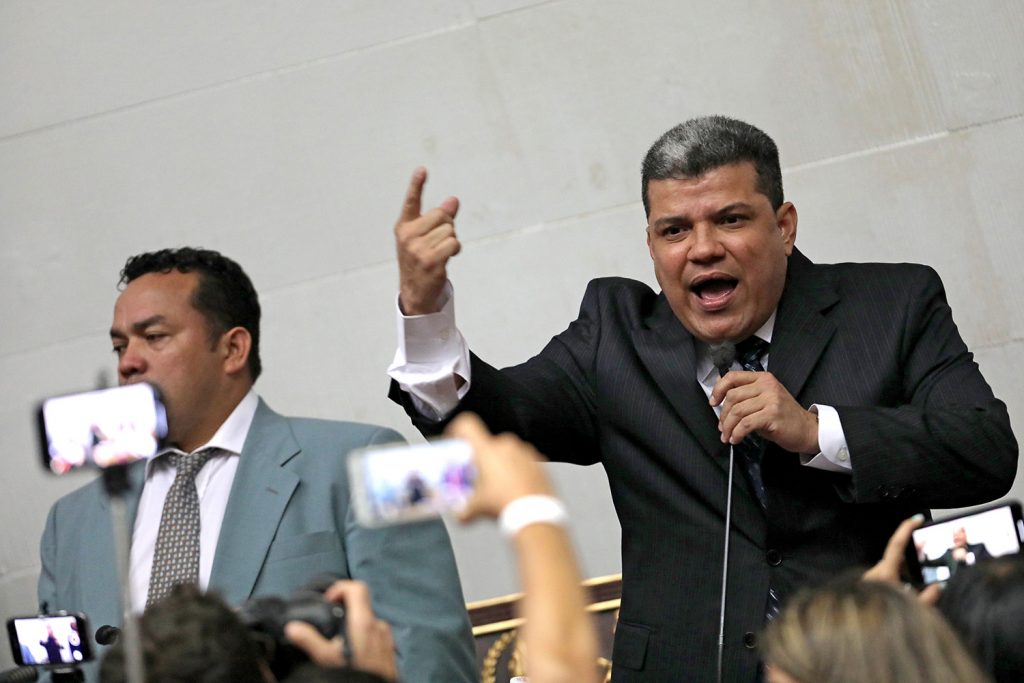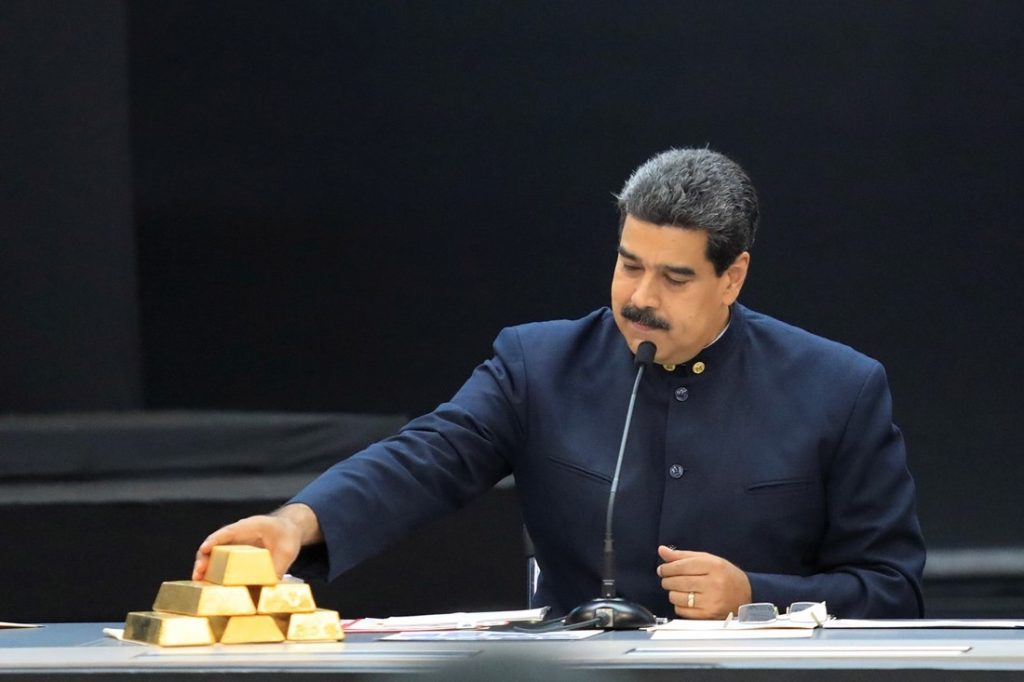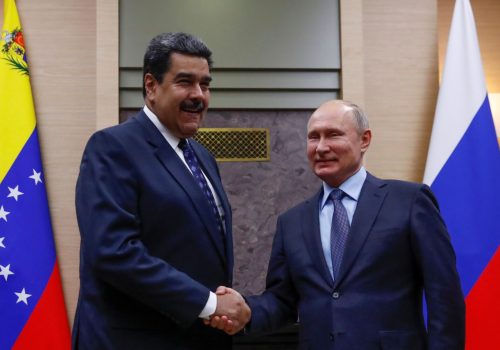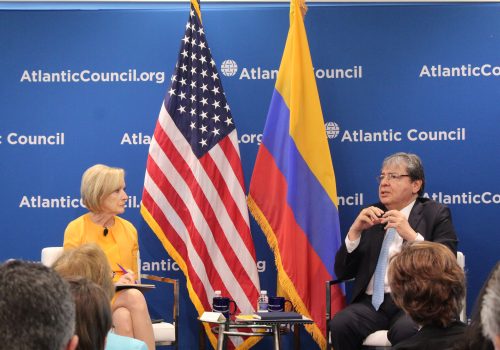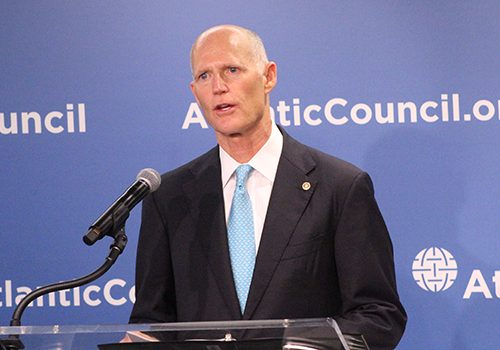On January 5, Venezuelan National Assembly representatives re-elected, with 100 votes, Juan Guaidó as leader of the body. The vote followed an attempt by a minority faction, without quorum, to illegitimately install regime-backed candidate Luis Parra as leader of the assembly. Though the regime’s efforts to delegitimize the National Assembly vote did little to further seal Nicolás Maduro’s grip on power, the future of the country hangs in the balance as the crisis worsens by the day.
Following the January 5 vote and the regime’s oppression of the representatives, Jasper Gilardi sat down with Jason Marczak, director of the Adrienne Arsht Latin America Center, and Diego Area, associate director of the Adrienne Arsht Latin America Center, to ask what is next for Juan Guaidó, the democratic force’s efforts, and what steps the international community ought to take going forward.
Gilardi: What do the Maduro regime’s attempts to delegitimize the National Assembly vote on January 5 mean for Venezuelans in and outside of the country? What kind of message does this type of move send the international community?
Marczak: The images of Juan Guaidó and other democratically-elected members of the National Assembly being physically barred from entering the assembly building was visible proof of how far Nicolás Maduro is willing to go to deny any semblance of democracy in Venezuela. His increasingly authoritarian tactics to usurp whatever control he can muster demonstrate that he has, time and time again, attempted to thwart the will of the Venezuelan people, denying them the legitimate representation that they voted for.
Area: The events of January 5 symbolize what the international community has been denouncing for the past year. It symbolizes one of the worst dictatorships in recent memory, which is not only causing protracted suffering within Venezuela, but is also having a significant impact on the region, with five million Venezuelans seeking refuge in other countries.
Learn more about the Adrienne Arsht Latin America’s January 9 event:
Gilardi: What are the implications of Guaidó’s re-election as National Assembly president for the regime?
Marczak: The National Assembly maintains its leverage. From a nuts and bolts perspective, countries have been apprehensive about striking deals with the Maduro regime, because if those deals have not been approved by the National Assembly, they would be seen as illegitimate when Maduro loses his grip on power. With democratic forces controlling the assembly, continued doubt is raised as to the legitimacy of a contract that is signed by Maduro and is supposed to be approved legislatively but does not pass through the Assembly.
As well, the January 5 events showed the extent to which Maduro’s supporters in the international community—specifically Russia—are willing to go to provide Maduro with backing. Within seconds of the illegitimate coronation of Luis Parra as the National Assembly president, Sputnik News and Russia Today published stories saying that Juan Guaidó was no longer part of the National Assembly. Why? Because Juan Guaidó would no longer have constitutional authority, and there would no longer be a legitimate interim government.
Area: To add to that, the rest of the international community was potent in recognizing Guaidó as interim president and denouncing the violence in Caracas, and not only the European Union, the Lima group, and the United States, but other countries that have taken more moderate positions on Maduro, like Mexico and Argentina.
Marczak: In the end, what Maduro did completely backfired. It was an attempt to try to wrest control of the National Assembly from the interim government, and to fracture the international community from recognizing Juan Guaidó as the head of the National Assembly and the interim government. But it did exactly the opposite. The international community came out with a series of statements recognizing Guaidó and condemning Maduro’s actions, and they weren’t just the countries that have been strong supporters of the interim government, but even countries that have tried to act as mediators by taking a middle-of-the-road position.
Gilardi: What does the future hold for the opposition coalition led by Juan Guaidó?
Area: First, we saw Guaidó, his democratic alternatives, and the democratic forces of Venezuela fighting against every wall that was put up by Maduro yesterday. And second, the fact that Guaidó withdrew his affiliation with his political party, Voluntad Popular (Popular Will), also demonstrates a potential strategy to renovate the democratic forces. It’s a great moment for the opposition to build a more inclusive movement.
Marczak: This might be an opportunity for democratic forces to better align strategy much earlier than they otherwise would have in anticipation of the National Assembly elections later this year. Looking ahead, one of the biggest challenges for the National Assembly elections, as has happened previously in Venezuela, is a fracturing opposition. This is what Maduro wants. He wants to go into the elections with scattered opposition. What happened on January 5 is only going to further unite the democratic forces, and show the true face of those who have been coopted by the Maduro regime, people like Luis Parra. Going into the elections Venezuelans will be able to tell the difference between the puppets and the opposition.
Gilardi: So far, the international community has largely used sanctions to push the Maduro regime. What should their steps be moving forward? Should the strategy change?
Marczak: The international community needs to target illicit activities that are funding the regime. Sanctions only work against a legally-operating government because they target legal sources of revenue, but this is not a legal, normal, or functioning government, so sanctions will not work on their own. The international community needs to go after the sources of financing that are keeping the regime afloat: the arms trade, gold smuggling, human trafficking, the drug trade, corruption, et cetera. That’s what you have to go after. That’s how you’re really going to put pressure on the regime.
Jasper Gilardi is a project assistant for the Adrienne Arsht Latin America Center at the Atlantic Council. Follow him on Twitter @gilardi_jasper.
Further reading:
Image: FILE PHOTO: Lawmaker Luis Parra speaks during a swearing-in ceremony at Venezuela's National Assembly in Caracas, Venezuela January 5, 2020. REUTERS/Manaure Quintero/File Photo
